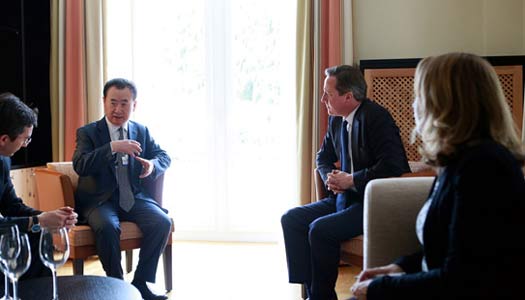UK companies networking to lure investment from China
Updated: 2013-04-23 08:07Indeed, the numbers tell the story. UK Trade and Investment, the central government arm responsible for attracting inward investment, had a total of 2,252 employees including trade advisers in 96 overseas markets as of March 2012. In comparison, Flintshire County Council's Regeneration team, responsible for economic growth, has only 25 employees.
But with UKTI organizing many events for Chinese businesses in London, where it is headquartered, regional governments like Flintshire County Council now feel increasingly compelled to promote local opportunities independently.
Though the council's meeting with the Chinese delegation was certainly a good start, Zhou feels there are more ways his team can help, including promoting communication and cooperation between enterprises on both sides, as well as helping exchange of delegations, providing them with information on how to exhibit products at trade fairs in China.
Flintshire is not alone in its endeavor to build the China link. Many British local governments have established extensive cooperation links with China, resulting from years or decades of work.
One example is Essex, a county northeast of London, which signed a friendship agreement with Jiangsu province in 1992, and has since worked with Jiangsu extensively in trade, investment, education and culture.
"When we first met to explore opportunities, we realized that the two areas have common features and aspirations. Both regions have a large port with abundant logistics facilities, and both champion the development of offshore wind technology," said Peter Manning, head of international trade at Essex County Council.
In 1994, formal trade delegation visits between the two areas began on a regular basis. In recent years, two Jiangsu companies, Jiangsu Sainty Bancom Wood and Phoenix Publishing and Media Group, established offices in Essex. Several Essex companies have also established offices in Jiangsu, Manning said.
To support businesses on the ground, the Jiangsu provincial government and Essex County Council have exchanged a member of staff to work at each other's offices.
Cooperation in cultural and educational fields has also boomed, with exchanges of students between schools. The Jiangsu provincial government also regularly sends groups - 60 Chinese teachers at a time - to Essex to teach Mandarin and learn valuable lessons about a Western education system.
Last year, Essex county council helped the Colchester Castle Museum host a temporary exhibition of Chinese artifacts belonging to Nanjing Museum, which created a significant boost for tourism in the local area.
Twinning with a Chinese province or city has become a popular method for UK local governments to quickly develop targeted links with China. Examples include Sunderland with Harbin, Sheffield with Chengdu, and Nottingham with Ningbo.
In addition, local businesses and academic institutions also play a key role in helping local governments attract inward investment, offering valuable market knowledge and contacts.
One example is the University of Nottingham, which is doing research and development to help the Chinese automotive producer Changan Automobile Group Co Ltd upgrade its technology. This cooperation has led Changan to establish an R&D center in Nottingham, creating more than 60 jobs.
The University of Nottingham's Asia Business Center is working closely with Nottingham City Council to draft the council's China engagement strategy, said a council spokesman.
But the UK's local governments do not just work hard to attract Chinese investors, they do much more to help Chinese businesses to grow and prosper in the UK.
"We are keen for investors to grow, because that would create local jobs and drive the local economy," said Andrew Finney, councilor on Basingstoke and Deane Borough Council, whose team has helped the Chinese telecommunications company Huawei extensively over the years.
When Huawei moved its UK headquarters from London to Basingstoke in 2003, Finney's team helped Huawei find a suitable office, accommodation for employees, and a location for a company canteen.
As most UK schools require students to register in advance due to capacity restraints, Finney's team worked especially hard with local schools to create extra capacity to accommodate the children of Huawei employees. His team also made Huawei a member of its local business forum, which hosts meetings for businesses to discuss the growth strategy of the local area.
"Huawei has become an integral part of our community," Finney said, adding that witnessing Huawei's headquarters team grow from only 150 employees in 2003 to 400 now is particularly rewarding.
Finney adds that Huawei's contributions to Basingstoke go beyond direct economic results. "Firstly, as Huawei is one of the major Chinese investors in the UK, we can use Huawei as a promotional case study to attract more investment," he said.
"Secondly, the Chinese children made a great contribution to our local schools, because they demonstrated to some of our children that hard work does pay results."
As Huawei expanded rapidly in the UK, it had to look for larger office space. After realizing the difficulty of finding this in Basingstoke, Huawei announced that it would move its headquarters to Reading, later this year.
Finney said the news is unfortunate, but emphasizes that as the council is constructing a new business complex, called Basing View Business Park, he hopes there will be future opportunities to attract Chinese investment.
"Huawei needed a building now, so Basing View's development was not quick enough to meet their needs, but the experience we have gained working with Huawei is invaluable and will come into use when we work with other Chinese investors in the future," Finney said.
- BYD exports three electric cars to Thailand
- Grid gets first jolt of residential solar power
- US now largest buyer of China's exports
- China's outbound M&As on the rise
- Tobacco control may entail price, tax rises
- Quanzhou becomes pilot financial reform zone
- New automobiles shine at Geneva Motor Show
- World's longest high-speed rail 'on track'
- Jiugui Liquor involved in plasticizer scandal again
- Accident reignites school bus safety concerns
- China to revise labor law
- Trademark registration under scrutiny
- Dinner ban takes toll on liquor firms
- CIC tables bid for London's Chiswick Park
- Property buyers eye overseas market
- Call for law to protect personal information
- China to cut train ticket prices
- Christmas business
- Solar industry to get jolt from new policies
- KFC chicken under spotlight















